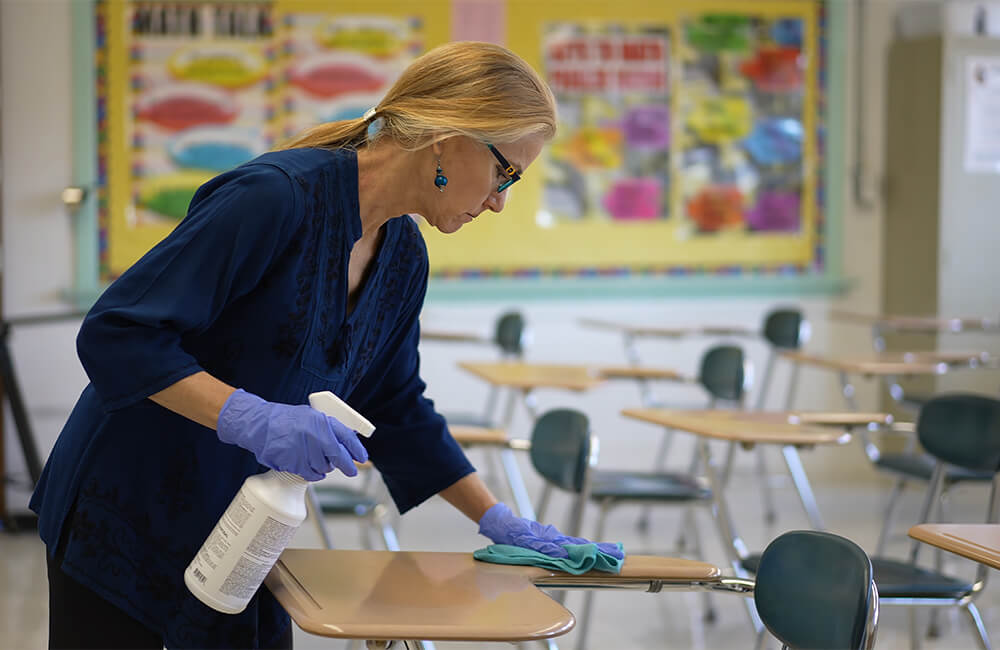


Marketing to education in the 2021-22 academic year: Find out what’s happening in schools

Schools across the UK have now opened for the 2021-22 academic year, and there are some changes to the way they’re operating.
From official government guidance to insights into what the new academic year will look like, here I’ll tell you what’s happening in schools this September, how they’re learning to live with the effects of the pandemic and how this impacts your marketing to education for the 2021-22 academic year.
Government guidance
The government released updated guidance in July to help schools, teachers and staff prepare for the new academic year. This operational guide outlines the actions that schools should take to prevent the spread of coronavirus in their school.
Firstly, the government says that schools should be learning to live with the pandemic. It’s essential to do this now reduce further disruption to pupils’ education.
Schools should make it a priority to deliver face-to-face, high-quality education to all their pupils.
Schools must comply with health and safety measures, put proportionate control measures in place and regularly review risk assessments.
All schools must have an outbreak management plan, outlining what they will do if there are any positive cases. This ensures the safety of the staff and pupils.
So what does this all mean for schools?
Social distancing
Measures have been relaxed in schools in England, Wales and Northern Ireland:
- It’s no longer necessary to keep children in bubbles.
- Full school assemblies are allowed to take place.
- Pupils can begin to mix at lunch and break times.
- Schools no longer have to carry out contact tracing.
- Staggered start times aren’t necessary.
In Scotland, stricter restrictions are being maintained until the end of September.
Face coverings
Face coverings are no longer needed in classrooms in England and Wales. However, they are still recommended in crowded spaces like school buses.
In Scotland, face coverings are still required until the end of September. In Northern Ireland, face coverings are required in classrooms for at least the first six weeks of term.
Covid-19 tests
In England, secondary school pupils will do 2 onsite lateral flow tests, 3 – 5 days apart, on their return to school. In Wales, Northern Ireland and Scotland, staff and pupils are encouraged to take home tests.
Staff and pupils across the UK are then encouraged to take twice weekly lateral flow tests at home until the end of September.
Self-isolation
If a pupil or staff member tests positive, they’ll be asked to isolate by the NHS Test and Trace app for 10 days. The pupil, or their parents, will be responsible for providing the information about close contacts within school.
Close contacts will then be asked to take a PCR test, but they don’t have to isolate unless they test positive. This is to avoid whole classes being sent home. This advice will be reviewed at the end of September.
Despite some clear changes being made, schools are still advised to have a management plan that includes the potential reintroduction of bubbles for a temporary period to avoid too much mixing.
The government says that schools should:
- Continue to ensure good hygiene.
- Maintain appropriate cleaning regimes.
- Keep heavily occupied spaces well ventilated.

Education recovery
The government reported that pupils in the UK have missed out on roughly a third of their learning time during the pandemic. They’ve pledged £1.4 billion to help school children in England to catch up in core subjects.
In addition to this, a number of programmes and grants have been announced to further support education recovery. Check out our LinkedIn article on opportunities for education suppliers to see a breakdown of the different grants.
The government is continuing with free school meals for eligible pupils, as well as promoting pupils’ wellbeing and support with mental health grants.
Exams
Exams are expected to return in 2022. However, there will be modifications due to pupils being disadvantaged because of lost learning.
- In England, pupils may be told the topics that will come up in GCSE and A Level exams.
- In Wales, exams will be modified.
- In Scotland, course content for National 5, Higher and Advanced Highers will be reduced.
- In Northern Ireland, there will be fewer papers in national exams.
Detailed plans for exams will be confirmed later in the academic year.
Ofsted
It’s expected that Ofsted will resume inspections in the usual way. However, this guidance may change in the coming months.
What this all means for you
Firstly, it’s important to remember that schools have different ways of interpreting the government’s guidance.
Each school may have certain things they decide to do differently. For example, we know that some schools have decided to continue with bubbles for the short-term whilst they settle into the new academic year.
As pupils return to schools, there is a risk regarding children having mixed socially over the summer. Children will have come from different social circles, with some having been abroad for holidays. There could be potential disruptions as pupils begin to mix again.
Schools are expected to keep high-quality, remote education provisions in place. This means that a lot of the provision that was in place when schools were closed, and children were learning from home, will be expected to continue in the event of more school closures.
It remains important that schools provide resources for children who need to self-isolate or who may be abroad quarantining. This means continuing opportunities for businesses offering remote education solutions.

For schools, September marks the first proper start to an academic year since September 2019. As schools learn to live with the new Covid-19 rules, they can approach the new year with some level of confidence that it will run more smoothly, with much less disruption to pupils.
75% of schools put spending plans on hold last year because of the pandemic. Now, they’re ready to start spending again by pushing ahead with their plans.
Schools will engage with marketing campaigns more as they return for a more consistent academic year. You can expect that email marketing engagement rates will be much higher.
What next?
September and October are the busiest months for marketing to schools, so now is the perfect time to keep building your brand awareness and generating leads.
Get in touch today on 01257 460036 or email info@buzz-education.com to plan your marketing for the 2021-22 academic year.






